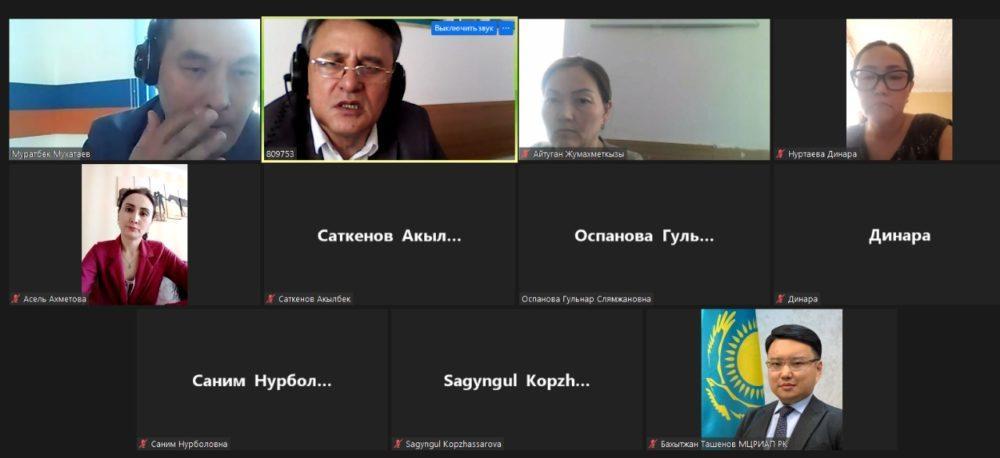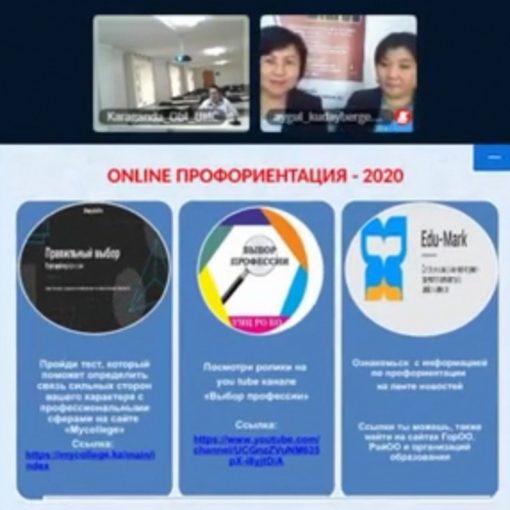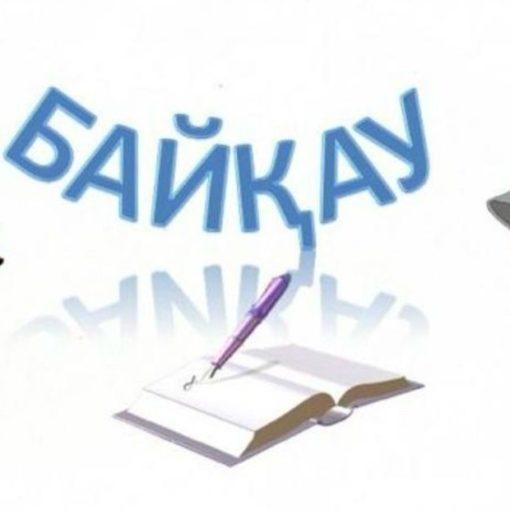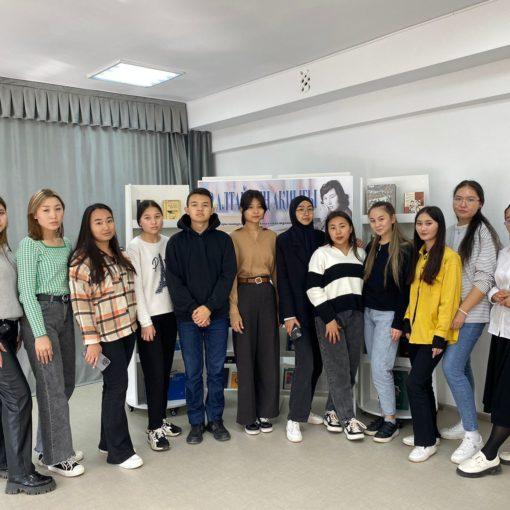Section № 1 “Actual problems of legal science and law enforcement practice” was traditionally held at the highest scientific and theoretical level!
Geography of the Conference. As a part of implementation and expansion of international cooperation in the sphere of scientific activity at the conference scientific reports of the participants from Russia were presented: Khakass State University named after N.F. Katanov, Abakan, Russian Federation; Saint-Petersburg Law Institute (branch) of the Procuracy University of the Russian Federation, Saint-Petersburg, Russian Federation. There were presented for discussion the reports of participants from other universities and institutions of Kazakhstan: Karaganda University named after Academician E.A. Buketov: Karaganda Economic University of Kazpotrebsoyuz; Karaganda Academy of MIA of RK named after B.Beisenov; Kokshetau University named after A.A. Myrzakhmetov; Karaganda State University named after A.A. Buketov; Karaganda Economic University of the Republic of Kazakhstan named after B.A. Buketov; Karaganda Institute of Law named after A.A. Buketov. Abay Myrzakhmetov; Karaganda State University “Evening school №100”.
The section was attended by university professors, research institutes’ staff. Some of them were active in discussion of the problematic issues related to the topical problems of legal science and law enforcement practice.
All in all, 41 papers were submitted to the Section “Current Problems of Legal Science and Law Enforcement Practice”, of which 10 were in Kazakh and 31 in Russian. Fifteen papers were prepared by the teaching staff of the “BOLASHAQ” Academy.
The improvement of quality of submitted reports, diversity of topics of scientific researches, increase of professionalism of scientists were noted. Scientific results of the best authors of reports are distinguished with novelty and relevance, and what is especially important – have a serious applied value and in further scientific development. It is also necessary to note the high level of preparatory and ongoing work of the organizers in the sections and the presentation of reports using modern technical means.
The legal system of the Republic of Kazakhstan develops dynamically which is promoted by fixation of conceptual directions of its development at legislative level, planned character of law-making activity, availability of effective legislation regulating law-making activity, account of law enforcement practice during development of new legal norms, and also active application of achievements of legal science.
The topics of the conference materials submitted for discussion are quite varied:
Akmagambetov M.D.
THE LEGAL MECHANISM OF STATE REGULATION OF LABOUR MIGRATION
Akmagambetova A.V.
THE LEGAL NATURE OF OBLIGATIONS
Artyomenko D.A.
CRIMINAL LIABILITY FOR FICTITIOUS REGISTRATION
(REGISTRATION) AT THE PLACE OF STAY OR AT THE PLACE OF RESIDENCE IN THE RUSSIAN FEDERATION
Artemenko N.N.
THE NOTION AND CHARACTERISTICS OF CULTURAL PROPERTY AS A SUBJECT MATTER OF THE CRIMINAL OFFENCE
Arystanbekov M.A.
DEVELOPMENT OF CRIMINALISTIC KNOWLEDGE AND ITS USE IN PRACTICE OF LAW-ENFORCEMENT BODIES ACTIVITY
Bakirov S.E.
FORMATION OF LEGAL CULTURE IN EVENING SCHOOL
Bolatov M., Muhataev M.
PROBLEMS OF PARLIAMENTARISM INSTITUTE DEVELOPMENT IN THE REPUBLIC OF KAZAKHSTAN
Gibert A.N.
FORENSIC ASPECTS OF PROFILING
Golovko I.I.
SURVEILLANCE IN THE PROSECUTOR’S ACTIVITY DURING THE SOVIET PERIOD
Ezhova K.I., Shvedchikova E.V.
ON THE SYSTEM OF LAW
Ezhova K.I., Shvedchikova E.V.
LEGISLATION SYSTEM: CONCEPT AND STRUCTURE (BY THE EXAMPLE OF RUSSIAN LEGISLATION)
Zhaksybekov N.K. CRIMINOLOGICAL CHARACTERISTICS OF MINOR CRIMES
Zhukobayev A.A., Akhmetova A.K.
IMPLEMENTATION OF INTERNATIONAL STANDARDS ON THE TREATMENT OF JUVENILE PRISONERS IN THE REPUBLIC OF KAZAKHSTAN
Zhumzhumaev N.S., Kozhakhmetov M.A. SOME QUESTIONS FOR IMPROVING CIVIL JUSTICE (PART ONE)
Ilesbekov A.B.
THE IDENTITY OF THE OFFENDER WHO INFRINGES ON THE CHAIN OF COMMAND AND STATUTORY RELATIONS BETWEEN MILITARY PERSONNEL
Kabzhanov A.T.
PHILOSOPHICAL AND LEGAL ANALYSIS OF WAR
Kenzhina S.A.
TO THE QUESTION OF YOUTH EXTREMISM
Kiikov A.A.
SOME ISSUES OF ANTI-DRUG ADDICTION ACTION IN COUNTRIES OF THE WORLD
Kopzhasarova S.I.
EXTRAORDINARY METHODS OF RESOLUTION OF LABOR DISPUTES
Koyanbay B.R., Mukhataev M.M.
THE CONCORDAT BETWEEN THE VATICAN AND THE REPUBLIC OF KAZAKHSTAN AS A SOURCE OF ADMINISTRATIVE LAW IN THE SPHERE OF ADMINISTRATIVE AND LEGAL REGULATION OF THE ACTIVITY OF RELIGIOUS ASSOCIATIONS
Kuanysheva S.N.
ISSUES OF CIVIL RIGHTS PROTECTION IN THE REPUBLIC OF KAZAKHSTAN
Kusainova A.A.
DETERMINANTS OF VICTIMHOOD
A. M. Maldybayev
ISSUES OF EXERCISING THE RIGHT TO CLAIM COMPENSATION FOR ENVIRONMENTAL DAMAGE IN THE REPUBLIC OF KAZAKHSTAN
Presnyak G.V.
MEDIATION AS A NON-JURISDICTIONAL WAY OF RESOLVING FAMILY CONFLICTS IN THE REPUBLIC OF KAZAKHSTAN
Sadykova K.K.
THE CURRENT SITUATION ON MARRIAGES AND DIVORCES IN THE REPUBLIC OF KAZAKHSTAN
Saken E.
FORMATION OF JUSTICE IN THE REPUBLIC OF KAZAKHSTAN AND ITS CONSTITUTIONAL FUNDAMENTALS
Saparov A.B.
ISSUES OF QUALIFICATION OF CRIMES AIMED AT INVOLVING A MINOR IN ANTISOCIAL BEHAVIOUR
Sarsembaev B.Sh., Seitkhozhin BO
POSSIBILITIES OF APPLICATION OF TECHNOLOGIES 3-D IN CRIMINALISM AND FORENSIC EXAMINATION
Serimov E.E.
ABOUT FACTORS OF CORRUPTION IN INTERNAL AFFAIRS
Togaibaeva Sh.S., Zhumabek M.B.
SOME LEGISLATIVE CHANGES IN THE FIGHT AGAINST CORRUPTION
Turganov O.A., Turganova Zh.E.
HIGHER EDUCATION IN THE FRAMEWORK OF THE MESSAGE OF THE PRESIDENT OF THE REPUBLIC OF KAZAKHSTAN KASYM-JOMART TOKAEV
Turganov O.A., Turganova Zh.E.
INTERACTION BETWEEN THE MEDIA AND THE LAW ENFORCEMENT AGENCIES
Turlaev A.V., Baikadamova K.A.
PROBLEMS OF OVERCOMING LEGAL NIHILISM IN MODERN CONDITIONS
Udin Y. С.
ACTIVITY OF POLICE PLENIPOTENTIARIES FOR PUBLIC ORDER PROTECTION
Chizhenok E.S.
THE ESSENCE OF MODERN RUSSIAN FEDERATION
Shvedchikova E.V.
ON SOME SPECIFICS OF GENESIS OF CAPITAL PUNISHMENT IN THE LEGAL SOURCES OF THE OLD RUSSIAN STATE
Shvedchikova E.V., Nikulina A.V.
DEVELOPMENT OF NATIONAL LAW IN THE REPUBLIC OF KAZAKHSTAN
Shvedchikova E.V., Chernenko D.S.
SUPPORT OF MOTHERHOOD AND CHILDHOOD IN SOLUTION OF DEMOGRAPHIC PROBLEM IN RUSSIAN FEDERATION
Shevchenko A.S.
LEGAL FORMS OF COMMERCIAL ORGANIZATIONS UNDER THE LEGISLATION OF REPUBLIC OF KAZAKHSTAN
Shevchenko А.S.
MAIN TYPES OF COMMERCIAL ORGANIZATIONS’ ACTIVITY
Shulenbaev E.A.
CRIMINAL LEGAL POLICY AS A WAY OF FIGHTING CRIME
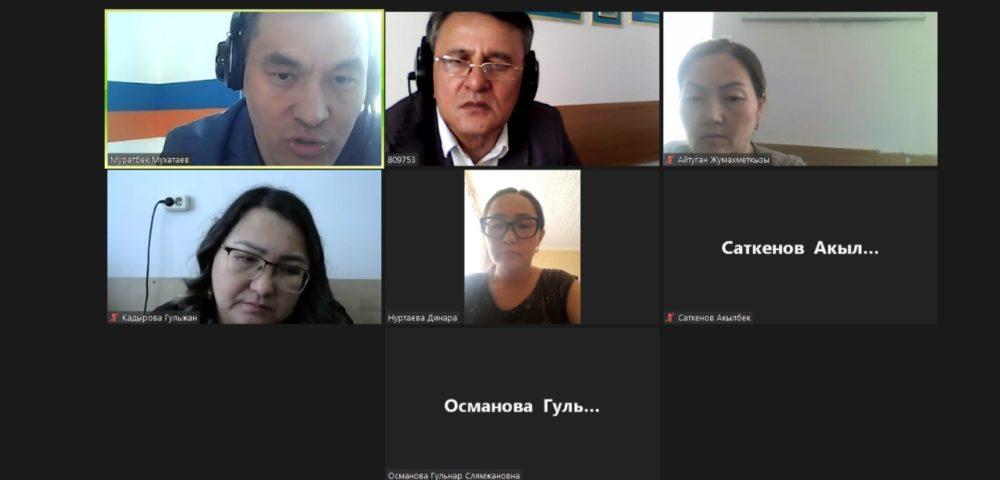
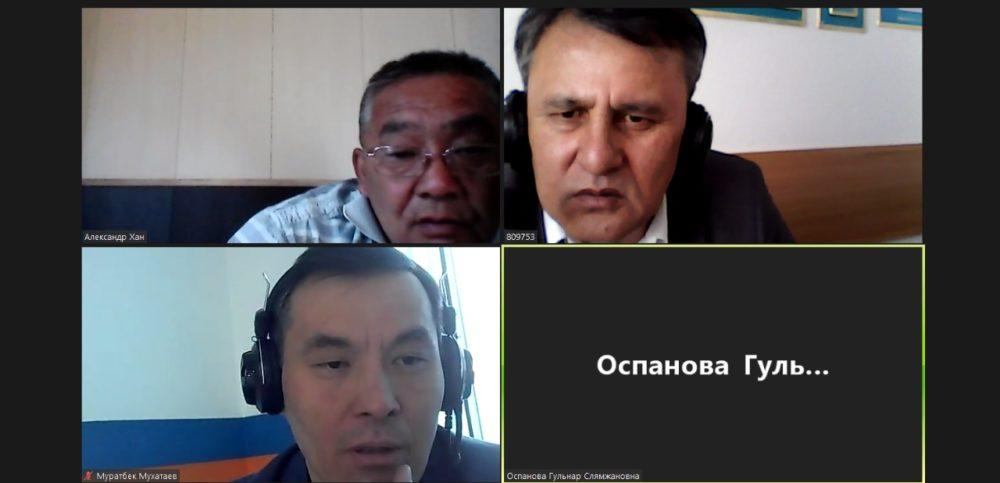
As part of the implementation and expansion of international cooperation in the field of scientific activities at the conference were presented scientific reports of participants from Russia: N.F. Katanov Khakass State University, Abakan, Russian Federation; St. Petersburg Law Institute (branch) University of the Prosecutor’s Office of the Russian Federation, St. Petersburg, Russian Federation. There were presented for discussion the reports of participants from other universities and institutions of Kazakhstan: Academician E.A. Buketov Karaganda University; “Bolashaq” Academy; Karaganda Economic University of Kazpotrebsoyuz; B.Beisenov Karaganda Academy of MIA of RK; Kokshetau University named after Abai Myrzakhmetov; Kokshetau State University named after A.G. Buketov; Karaganda Economic University of the Republic of Kazakhstan. Abay Myrzakhmetov; Karaganda Evening School No. 100.
An active participation in the discussion of topical legal issues took teaching staff Kabzhanov A.T., Mukhataev M.M., Ospanova G.S., Khan A.L., Satkenov A.A., Abdizhami A.J., Zhumzhumaev N.S., Kuanysheva S.N., Nurtayeva D.
The report on “Philosophical-legal analysis of war” of professor Kabzhanov A.T. The report analyzed the philosophical-legal analysis of the armed conflict between Russia and Ukraine. For the sake of objectivity and without taking sides the author conducts philosophical and legal analysis of the ongoing geopolitical conflict in the form of an armed confrontation between the parties. Based on the norms of international humanitarian law and philosophical understanding the author assesses the concepts of “war”, “aggression”, “special military operation” and defines their interdependence. The determinants of armed clashes are analysed. Unwanted disregard for the norms of international humanitarian law is disclosed and peace, as a civilized way of resolving any conflicts, is called for.
Associate Professor M.M. Mukhataev made a presentation on the preceding constitutional reforms. The rapporteur noted that all amendments to the Constitution are interlinked with each other and have a common conceptual logic. Therefore, when discussing individual points, it is important not to miss the big picture as a whole, since the purpose of the constitutional reform is the systemic transformation of the current political model. The participants of the breakout session agreed that the reforms will result in a new, better balance between the branches of power and an effective dialogue between the state and society. It forms the basis for transition to the new model of the state system – the Second Republic.
The senior lecturer Ospanova G.S. in her speech “Strategy of formation of evidences on a scene” noted that a scene has a great informative character and reflection of traces of a crime. Often an investigator marks and states the place of incident. It is recommended to fix them for further proof in criminal proceedings, i.e. to strictly follow the legal rules of evidence collection, use, investigation and evaluation. Professor A.L. Khan gave his expert opinion on electronic digital evidence, giving practical examples.
Also within the framework of the sectional meeting a scientific report of senior teacher Satkenov A. on the topic: “Tactical combination when giving response” was heard. The speech of the young scientist aroused the interest of senior colleagues, who gave their recommendations on the topic.
Decision on the results of the section work:
The Working Group on the section “Actual problems of law science and law practice” of the International Scientific Conference “Science and education in the modern world” developed the following DECISION:
1. To consider the work of the Section “Actual Problems of Law Science and Law Enforcement Practice” of the International Scientific Conference “Science and Education in the Modern World” as successful, to note a high scientific and organizational level of the event.
2. To continue the work on further establishment of contacts with institutes of higher education, academic institutes, scientific-research institutes and law-enforcement bodies of the Republic of Kazakhstan.
3. To inform the management of Universities and scientific institutions, which sent scientists for participation in the conference, about the results of the conference, and also the decision of the conference.
4. For organization and holding of the International Scientific-Practical Conference “Science and Education in the Modern World” at a high level, to express gratitude to the members of the Organizing Committee of the conference, as well as members of the editorial board of the Proceedings of the conference.
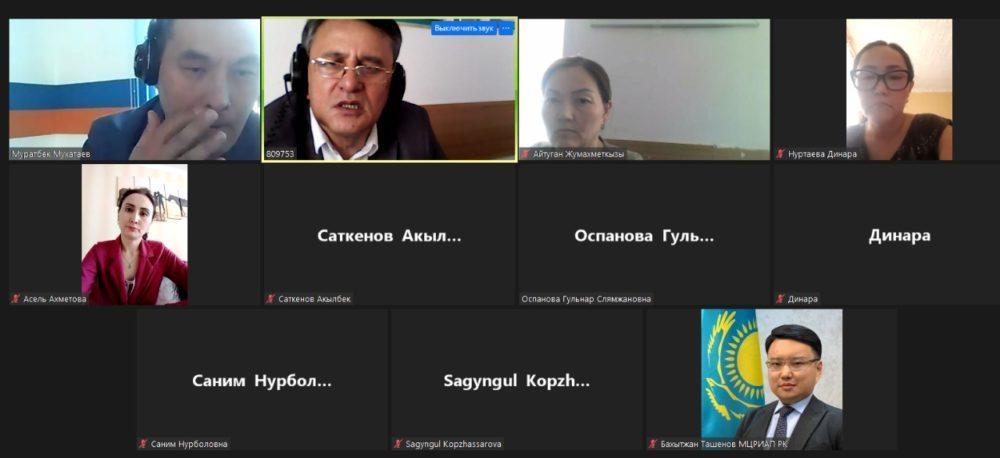
We recommend to the authors of the papers of the section “Current Problems of Legal Science and Law Enforcement Practice”:
1. When preparing a scientific paper, take into account that its content should include presentation of own conclusions and interim or final results of their scientific research, experimental or analytical activities.
2. Scientific article shall have the effect of novelty: the results set forth in it shall not be published earlier, i.e. by publishing a scientific article the author assigns for himself the priority in the chosen field of research.
3. In a prepared research paper, for better perception of the amount of work carried out and the results of your research activities, present the material in a visual form: make diagrams, charts, graphs, tables. This will not only help you to systematise the information you have obtained, but also help your readers to better understand you and use your material in their professional activities. Tables should have headings and graphical material should have captions. Each such element should be directly linked to the text of the article and a reference to it should be included in the text of the article.
4. A scientific article has a structure commonly accepted in the scientific community and consists of the following main parts: title, abstract, keywords, introduction, main part, conclusion (conclusions, analysis, synthesis, critique), list of references.
5. When drafting the title of a research article, remember that the title of the article should serve two purposes: to reflect the content of the article and to attract the interest of readers. As well as the text of the paper itself, the title should be written in a scholarly style and reflect the content of the paper as concretely as possible. It is desirable to include in the title several key words that relate to the essence of the issue. The length of article title should not exceed 10-12 words.
6. When you start writing a research paper, imagine the person for whom you are writing it. Provide commentary on areas that are difficult or difficult for your audience to understand, but it is important to strike a balance here and not to start explaining elementary and well-known truths. Scientific language uses bookish, neutral vocabulary as well as special terminology. Do not use unfounded borrowings, and those that you need to strengthen your ideas in the form of a quotation with links to the original source.
Chairman of the section Kabzhanov A.T.
M.M. Mukhataev M.M. is responsible for the research work of the department.

